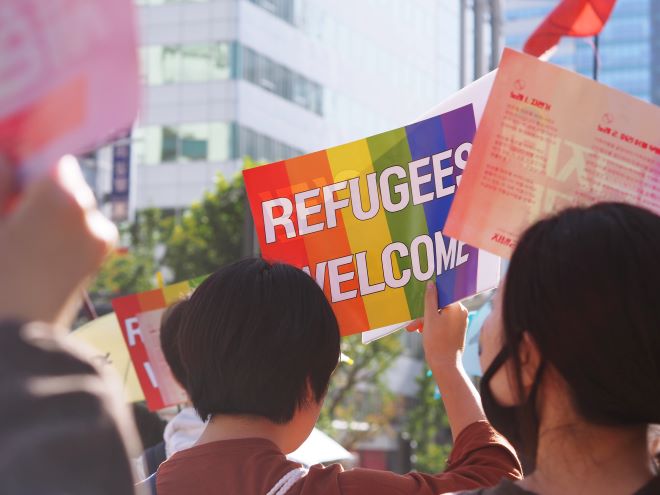Wherever you land on the thorny issue of undocumented immigration, Wednesday was a day to make a Philadelphian proud. That morning, 28 migrants whom Texas Gov. Greg Abbott sent north on a bus (he’s done this with hundreds of buses to Washington, D.C. and New York City) arrived at 30th Street Station and were greeted — as refugees often are here — with handmade welcome signs, food, clothes and shelter.
Mayor Kenney spoke for many of us when he announced that “As a proud welcoming city, Philadelphia will greet our newly arrived neighbors with dignity and respect.”
That greeting — dignity, respect, kindness — is one our city offers to refugees continuously. Last year, most visibly, we welcomed Afghan refugees fleeing the Taliban. That time, the flood of people who signed up to volunteer with the Nationalities Services Center was almost more than the organization could handle.
Even outside of the headlines, though, thousands of refugees and immigrants move to Philadelphia every year. They are part of what makes this city so special. Immigrants account for our population growth, many of our small businesses, our wide palate of restaurants, community festivals, and the continuous pleasure of new cultural experiences that make urban life exciting.
How to help refugees in Philly
Donate money
The Nationalities Service Center’s Humanity Fund helps the organization resettle 5,000 refugees in the area every year, including by helping to furnish homes, provide school supplies and purchase winter coats. HIAS Pennsylvania supports about 4,000 low-income refugees and immigrant families, and allows donors to direct funds towards general help, legal or social services.
Or, send funds to any of several other organizations in town that work with specific immigrant populations, including SEAMAAC, Juntos, Puentes de Salud, VietLead, African Family Health Organization (among others).

Volunteer
Think of the many, many things that would be unfamiliar to you if you’d just arrived from a very different place and culture. Pretty much anything you can imagine is what refugees experience here.
You can give or help folks shop for winter clothing; get furniture and kitchen supplies; show them how SEPTA works; deliver groceries; offer rides to appointments, and so much more. To work with HIAS Pennsylvania, create a volunteer profile, sign up for an info session and then browse opportunities here, including meal prep and airport (or bus) welcome. Register as a volunteer with the Nationalities Service Center here, and then sign up for the agency’s volunteer newsletter here, to find out about needs as they come up.
Be a “neighbor”
Among the volunteer opportunities available at HIAS is being a “Philly neighbor” for a family of immigrants, working with them to master a handful of set tasks that could include help with searching for a job, dealing with a landlord, reading mail or conversing in English.
Advocate
The most recent major humanitarian crises that have forced people to flee include the U.S. withdrawal from Afghanistan, last year’s devastating earthquake in Haiti and the expansion of Russian aggression in Ukraine — but people arriving here come from many different countries, and are helped or hindered by many different policies. You can find some of the most time-sensitive issues requiring the attention of our elected officials here, along with ideas for what specifically to ask of them.
Beyond that, though, is addressing the failure of our politicians to formulate and pass comprehensive, fair and viable immigration reform — a failure that goes back decades. (This article from the nonprofit Migration Policy Institute is a good primer on the history.) Call your legislator and tell them to do better.

Be informed
Immigration is way more complicated than talking points or political stunts would have you believe. For example, what’s the difference between a refugee and an asylum seeker? What does Philly’s “Sanctuary City” status mean? What do immigrants do for our community? HIAS offers a good explainer for all of these questions, with the intention of giving you insight to convince your friends, neighbors and leaders to make informed decisions about how we treat newcomers to our city.
Offer a spare room, apartment or house
If you have a spare room, sign up with Airbnb’s Open Homes program, which HIAS Pennsylvania has partnered with to provide temporary housing for their clients. (Hosts have full control over when and who they accept, and would liaise with a HIAS Pennsylvania PA staff member around specific housing requests before making the decision.)
Donate furniture
Most organizations don’t have storage space to keep your old couch, but you can donate to the nonprofits from which they source. HIAS Pennsylvania frequently works with Philadelphia Furniture Bank, which connects clients with a full home’s worth of furniture and new bedding, and Uhuru Furniture and Collectibles, which offers fast and free pick-up and delivery at low or no cost.
NSC also has an Amazon Wish List of frequently-needed items to set up a home, including tea kettles, waste baskets and plates.

Provide pro bono legal services
HIAS Pennsylvania works with pro bono lawyers who donate their time and services — even if you don’t have specific experience working in immigration, they can train and support you. Sign up to help here.
Offer jobs
The biggest need for many of the migrants who arrived this week — and always — is finding ways to support their families. That means a job. If your company has opportunities for refugees or immigrants settling in, you can tell NSC here and work with the organization to find the right person.
![]() RELATED
RELATED


